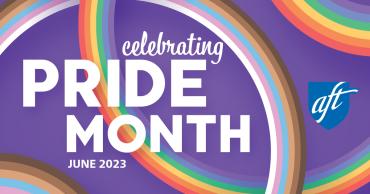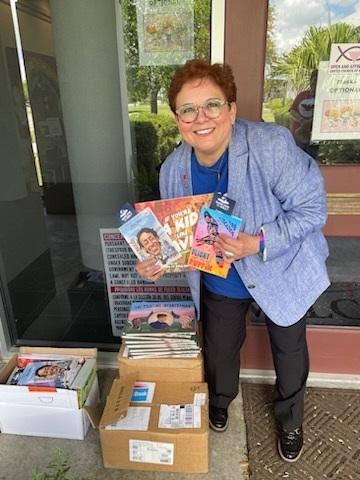It’s been a rough year for the LGBTQIA+ community. The Human Rights Campaign has issued a state of emergency for LGBTQIA+ people in the United States. More than 525 anti-LGBTQIA+ bills have been introduced in state legislatures; more than 76 have already passed. Taken together, the bills push trans healthcare bans, require misgendering of trans students and support trans sports bans, trans bathroom bans, book bans, drag bans and “don’t say gay” bans.
Teachers, school staff and professors fear for their jobs if they discuss sexuality or gender, and healthcare workers worry not just for themselves but for the LGBTQIA+ patients they advise. LGBTQIA+ members of the AFT fear for their own safety, as hate groups attack parades, drag story hours and other events.
It all makes for mixed emotions this Pride Month, the annual June celebration that began with the Stonewall Uprising in New York. Like then, there is outrage over injustice, but there is also joy as people gather to fully express themselves in parades and other gatherings that validate and embrace them just as they are.
Patty Crispino, an AFT LGBTQIA+ Task Force member and a member of the United Federation of Teachers, recognizes that outrage and joy in her own life. “When I first came out in the late ’70s, I had bottles and bricks thrown at me,” she remembers. “There was a time when they were attacking people with baseball bats. We’re coming back to that.” But while Crispino is ready for that fight, she says, she also finds room for joy. “I celebrate Pride every day when I kiss my family hello,” she says, proudly describing her partner and two children.
For Chelsea Shotts, another taskforce member, a classroom behavioral assistant and a member of the Oregon School Employees Association, this month is “a Pride of queer rage.” Deeply bruised by hateful attacks against her, including a physical altercation with a Proud Boys member and being called a pervert, a pedophile and a groomer, she left a school district she loved out of fear. The attacks stemmed from defending her right to display a window sign with a rainbow, a heart and the words, “Be Known.” The American Civil Liberties Union of Oregon eventually filed a successful lawsuit on her behalf, but the experience has left its mark.
“I’m trying to feel celebratory, but I’m more scared than ever,” says Shotts. “The ugly has gotten so much more powerful.” She is especially worried about trans people whose visibility makes them more obvious targets. But she sees the community reaching for hope as well. “I want to celebrate and put on a big happy face for the young people,” she says. “You can’t ban queer joy. You can’t take away the beauty and the love of the community. You have to find ways to continue to nurture that. Focusing on young people is what really helps me.”
Eric Rader, a task force member and president of the Henry Ford Community College AFT, has been energized by fighting back. When the school board—which oversees both K-12 and higher education in Dearborn—threatened to ban books that include LGBTQIA+ characters and themes, Rader’s affiliate joined with AFT Michigan and others to defeat the measure. “Higher ed unions fight for academic freedom,” he said. “We fight for inclusion. We really need to stand up for these values. Our students have the right to learn, and we have the right to teach the truth.”
Rader also feels a more personal obligation to students, faculty and staff, many of whom are LGBTQIA+. “We have to stand up for our students and ourselves,” he says. “We have to be as inclusive as possible for our members, our students and the principles that we believe in.”
Broad reach
While these individual stories and battles play out, Pride proclaims a common sentiment: Be proud. Social media is alight with celebratory proclamations from high-ranking leaders like U.S. Secretary of Education Miguel Cardona, who has tweeted out multiple messages of support, and President Joe Biden, who issued an unequivocal proclamation of recognition. Parades and events crowd public calendars along with tributes and discussions marking the determination advocates feel even in the face of attacks on their freedom.
AFT affiliates are actively participating, marching in parades, hosting social gatherings and amplifying support and participation in the LGBTQIA+ community on Twitter, Instagram and all the other social media platforms. The AFT has a full page of Pride resources for members, is distributing books centering LGBTQIA+ people and is providing funds for affiliates to participate in Pride events.
Deep roots and resources
The AFT has a long history of fighting for justice for LGBTQIA+ people, and that commitment has only deepened in recent years. To begin with, the AFT was the first international union to support protections for LGBTQIA+ workers. Today, we have six resolutions we’ve passed detailing the union’s commitment to justice for LGBTQIA+ people:
- Defeat Anti-LGBTQIA+ ‘Don’t Say Gay’ and Anti-Transgender Bills and Attacks with Mass Pride and Mass Action
- In Support of LGBTQ Youth and Educators
- School Safety and Educational Opportunity for Lesbian, Gay, Bisexual, Transgender, Queer and Questioning (LGBTQ) Students
- Bargaining LGBTQ Equity for Health Benefits and Working Conditions
- Support of the Rights of Transgender Persons—AFT Stands in Unity Against Discrimination in North Carolina and Mississippi
- Defend the Teaching Profession and LGBTQIA+ Educators and Students Against Proliferating Anti-LGBTQIA+ Measures
Resolutions declare intent, but the AFT also provides concrete resources to help educators carry out our mission of inclusion. Our free Share My Lesson platform of resources by and for educators features a section of LGBTQIA+ materials, with everything from explanations of pronouns to profiles of LGBTQIA+ leaders, detailed histories of the movement, book lists and plans for creating welcoming classrooms. An entire issue of the AFT’s journal American Educator is devoted to LGBTQIA+ content, and both American Educator and our AFT Health Care journal continue to cover topics such as equitable healthcare and educator autonomy regarding gender curricula. There is also a guide to creating safe and welcoming campuses for LGBTQIA+ faculty and staff.
The AFT also supports direct action: Our affiliate the United Faculty of Florida sued over a viewpoint discrimination bill that would allow students to secretly record professors to back accusations of teaching uncomfortable concepts, and the Florida Education Association filed a petition against censorship laws. We are working in other states to prevent similar legislation from passing, joining with community partners to crowd state legislative meeting rooms and hallways, knock on countless doors and write editorials and letters to elected officials and school administrators to establish safe and welcoming places for LGBTQIA+ students, workers and their families. The AFT’s LGBTQIA+ Task Force provides direction and inspiration for ongoing work in the LGBTQIA+ space.
And so, the celebration—and the fight—continues, framing joy as one more act of resistance.
[Virginia Myers]



